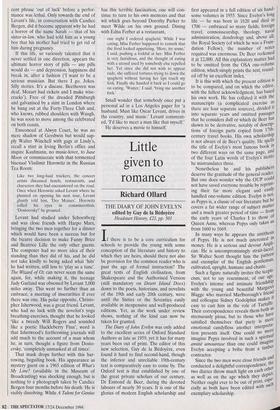Little given to romance
Richard 011ard
THE DIARY OF JOHN EVELYN edited by Guy de la Becloyere Headstart History, £21, pp. 501 I f there is to be a core curriculum for schools to provide the young with some conception of the literature and history to which they are heirs, should there not also be provision for the common reader who is past the age of formal instruction? The great texts of English civilisation, from Shakespeare and the Authorised Version (still mandatory on Desert Island Discs) down to the poets, historians, and novelists of the 19th and early 20th century, were until the Sixties or the Seventies easily available in inexpensive and well-produced editions. Yet, as the work under review shows, nothing of the kind can now be taken for granted.
The Diary of John Evelyn was only added to the excellent series of Oxford Standard Authors as late as 1959, yet it has for many years been out of print. The editor of this new selection, Guy de la Becloyere, even found it hard to find second-hand, though the inferior and unreliable 19th-century text is comparatively easy to come by. The Oxford text is that established by one of the great private scholars of our century, Dr Esmond de Beer, during the devoted labours of nearly 30 years. It is one of the glories of modern English scholarship and
first appeared in a full edition of six hand- some volumes in 1955. Since Evelyn's long life — he was born in 1620 and died in 1706 — embraced so many fields, foreign travel, connoisseurship, theology, naval administration, dendrology and, above all, the Royal Society (of which he was a Foun- dation Fellow), the number of notes required was enormous. De Beer reckoned it at 12,000. All this explanatory matter had to be omitted from the OSA one-volume edition, which simply prints the text, round- ed off by an excellent index. It is this with which the present edition is to be compared, and on which the editor, with the fullest acknowledgment, has based his own work. He has collated it with the manuscripts (a complicated exercise as there are four separate sources), divided it into separate years and omitted passages that he considers dull or which de Beer has shown to be derivative, notably of descrip- tions of foreign parts copied from 17th- century travel books. His own scholarship is not always of de Beer's quality. He spells the title of Evelyn's most famous book in two different ways on the same page, and of the four Latin words of Evelyn's motto he mistranslates three.
Nonetheless he and his publishers deserve the gratitude of the general reader. But one does wonder why the OUP could not have saved everyone trouble by reprint- ing their far more elegant and easily handled one-volume edition. Evelyn is not, as Pepys is, a classic of our literature but he covers a far wider range of subject
matter and a much greater period of time — from the early years of Charles I to those of Queen Anne, whereas Pepys only takes us from 1660 to 1669.
In many ways he appears the antithesis of Pepys. He is not much interested in money. He is a serious and devout Angli- can. He is uncompromisingly strait-laced. Sir Walter Scott thought him the pattern and exemplar of the English gentleman, cultivated, upright, humane and chaste. Such a figure naturally invites the scepti- cism, not to say resentment, of our age.
Evelyn's intense and intimate friendship with the young and beautiful Margaret, Blagge who married Marlborough's friend
and colleague Sidney Godolphin makes it easy to cast him in the role of Tartuffe. Their correspondence reveals them both as strenuously pious, but to those who have satisfied themselves that piety is mere emotional candyfloss another interpreta- tion presents itself. One could no rn°re, imagine Pepys involved in such a spiritual amide amoureuse than one could imagine Evelyn accepting a bribe from a timber contractor. Since the two men were close friends and conducted a delightful correspondence, the two diaries throw much light on each °t e!. as well as on the age which they dePict Neither ought ever to be out of print, espe: cially as both have been edited with sail exemplary scholarship.










































































































 Previous page
Previous page